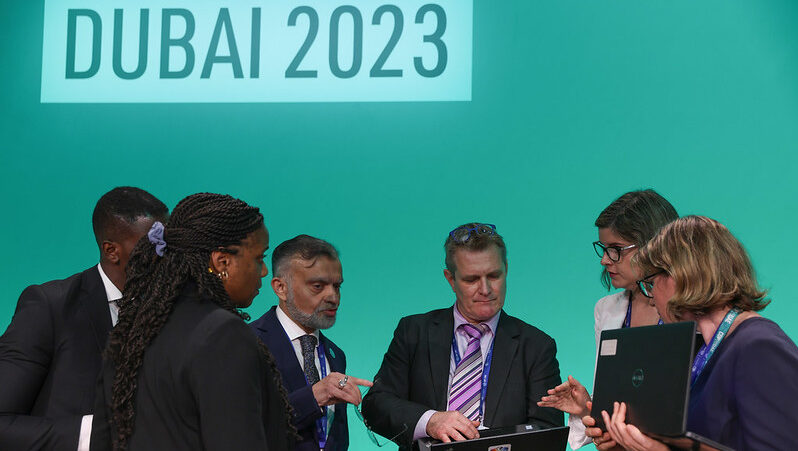As we enter the second and decisive week of Cop28 in Dubai, an agreement to phase out all fossil fuels and scale up renewables is edging close to a pivotal decision.
In these kind of talks just a couple of years ago, very few people at the table were able to even entertain conversations on the phasing out of fossil fuels.
But at the outset of Cop28, 106 countries jointly advocated for the fast decline of fossil fuels, a notable increase from the 80 countries demanding the same at Cop27 in Sharm el Sheikh. Over 120 countries have so far committed to tripling global renewable energy capacity by 2030.
The energy transition has finally been dragged centre stage. The Overton window has shifted significantly, and this is in no small part thanks to the resolve and determination of global south negotiators and their allies in the movement for climate justice.
Adaptation and justice
If we land an ambitious energy package in Dubai, it will once again be thanks to climate vulnerable nations, namely small islands states and Latin American countries in the Ailac grouping.
Wealthy blocs like the European Union must urgently address the adaptation concerns voiced by groups like the African group.
Insisting that the just transition work program exclusively focuses on in-country workforce issues while disregarding the global inter-country dimension is a pitfall that affluent nations must evade.
Negotiations for a global decision to phase out fossil fuels and a renewable energy target are above the paygrade of the mid-level diplomats that do the negotiating in the first week of Cops.
Ministers arriving today, at the start of the second week, is like Champions League football after watching non league.
Like football, the higher league doesn’t always reflect a difference in the quality of performances, but the sophistication of tactics applied, and the stakes that are on the table.
The Cop28 presidency will continue with a double layer of ministerial pairs between them and the energy negotiations, as Denmark and South Africa are facilitating discussions on the Global Stocktake. At the same time, discussions will be further outsourced to ministers from Singapore and Norway.
A significant portion of the UAE team comprises of Cop26 presidency staff, who were the first to apply a strategy of engaging countries in one-on-one negotiations rather than collective ones.
This approach undeniably furnishes the presidency with a knowledge advantage. The UAE could strike a backroom deal with big powers like the US and China rather than driving a transparent process and working with the champions of this process, the small island states and vulnerable countries to land the most ambitious outcome possible.
Different paces
Beyond navigating the broader landscape, achieving such an ambitious outcome demands a closer examination of critical issues within the substance of the energy package: Differentiation, urgency, and support.
At the heart of the fossil fuel phase-out and renewable energy target deal lies the need for fairness. This fairness must be reflected in language that unequivocally states developed countries take the lead, phasing out at a faster pace than lower income countries.
Currently, some developed nations propose a 2050 timeline for the energy transition, without a corresponding earlier hard timeline for developed countries – a clear incongruity.
A potential solution involves introducing qualitative language emphasizing the leadership role of developed countries while respecting the distinct starting points of low-income nations.
Instead of a 2050 timeline, countries should prioritise immediate progress in this decade. Finally, the energy package necessitates an integrated support plan, acknowledging the investment and support requirements in the global south outside China.
It should establish processes to ensure necessary support, potentially including direct links to the new collective quantified goal on finance and Cop29.
EU and US action needed
Climate-vulnerable nations have once again demonstrated leadership, but a pivotal political question looms: Will some developed countries align with them and form a progressive coalition?
At Cop27 last year, a few countries — Iran, Saudi Arabia, and Russia — opposed language on the phase-out of all fossil fuels.
The Egyptian presidency at the time was complicit in hiding behind these blockers. The signals from Cop28 President Sultan Al Jaber are inconsistent at best.
So far, more countries than at Cop27 in Egypt have voiced support for phasing out fossil fuels, but closer coordination among those countries fighting for an ambitious energy outcome will be needed.
To achieve this, Europeans, especially, must be more forthcoming and move beyond mere lip service on adaptation and support for the energy transition.
Don’t be fooled: CCS is no solution to oil and gas emissions
The global goal on adaptation remains a pressing concern, with negotiators making minimal progress. Ministers must transcend indicators and dimensions to expedite resilience preparedness.
This is EU negotiator Wopke Hoekstra’s first Cop. It will not only test his ambition but also his grasp of global climate politics and ability to collaborate with climate-vulnerable nations.
Positive actions could create a promising foundation, with the Canadian minister Steven Guilbeault expected to play a crucial role in fossil fuel discussions as a bridge builder.
A potential starting point for the US delegation would be to broaden their focus beyond coal to avoid alienating India, China, and other emerging economies.
Whether the European Union heeds the call of vulnerable nations will be a central question as we enter the decisive days. The prospect of bidding farewell to fossil fuels and embracing renewables gives real hope in our battle against climate chaos.
Andreas Sieber is the associate director of global policy & campaigns at 350.org.
